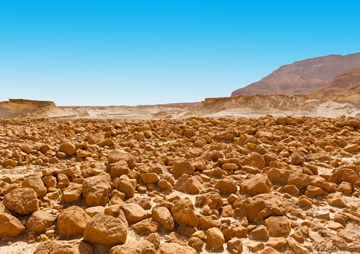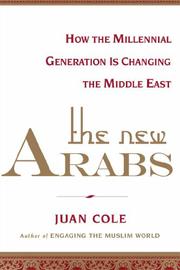The Arab Political Crisis: It Isn’t a Matter of Civilization and It Isn’t Unique
Al-Arabiya Washington bureau chief Hisham Melhem had a piece in Politico Magazine on Thursday on what he calls the collapse of Arab civilization. The piece is riddled with contradictions and fuzzy thinking and with all due respect to Milhem, who is a knowledgeable and experienced correspondent, I am going to disagree with it vehemently.
Climate change is producing increased aridity over time in the Middle East, with long-term droughts. Shutterstock
This post originally ran on Juan Cole’s Web page.
Hisham Melhem has a piece on what he calls the collapse of Arab civilization.
The piece is riddled with contradictions and fuzzy thinking and with all due respect to Milhem, who is a knowledgeable and experienced correspondent, I am going to disagree with it vehemently. I think he is arguing that Arabs bear a moral burden for the atrocities being committed in the region, and that they cannot duck it by blaming regional problems on European colonialism or the US invasion and occupation of Iraq.
Let’s take the 22 Arab League members (which include for political reasons non-Arabic-speaking countries like Somalia and Djibouti). There is nothing wrong with their civilization.
In the past 50 years, Arabic-speakers have gone from being perhaps 80% rural to being 80% urban. (There are still some significantly rural Arab countries like Egypt and Syria but even there the urban-dwellers are a majority). Even Saudi Arabia, which a century ago had a lot of pastoral nomads, is now as urban as the United States. They have gone from being largely illiterate to being, especially at the level of 15-30 year-olds largely literate. The proportion with high school and college educations has skyrocketed. They have access to world news through satellite television. Civilizationally, the average Arab today is way ahead of her parents and grandparents.
Obviously, the states of the Arab world are undergoing important transitions and some have collapsed. But state collapse is not the same thing as civilizational collapse, nor caused by it (whatever “civilization” is).
Why the states are collapsing is a good question for social science, but it isn’t the moral failing that Milhem makes it out to be, nor is it unique. I’d look at the following:
1. Demography. The Arab world is full of states that have had relatively high rates of population growth for 150 years. I have a hypothesis that this population boom is related to global warming, which also began in earnest about 150 years ago, and which may have reduced pandemics in the region which we know were common and cyclical in the medieval and early modern period (“plague”). Tunisia underwent a demographic transition and began leveling off, but most of the rest continue to have high birth rates (Egypt began to level off in 2005 but apparently the instability of the last three years has caused a new baby boom). High rates of population growth can contribute to instability if there aren’t enough jobs for the waves of young people coming on the job market every year. Gross Domestic Product is a matter of long division. So if the population grows 3 percent in a year, and the economy grows 3 percent, the per capita increase in GDP that year is … zero. Go on like that for decades and you’ll have economic and social stagnation. This is why China’s one-child policy was so smart. You couldn’t have had the post-1980 take-off in the same way if the rate of population growth had been like Egypt’s.
Is it an accident that the two countries that began undergoing a demographic transition in the 1970s, Tunisia and Turkey, are the two more stable ones in the region?
2. Productivity. Most Arab states were under European colonialism in the 19th and until the mid-20th century. No colonial administration was interested in promoting industrialization (in contrast, e.g., to Meiji Japan, which was independent and cared about Japan’s place in the world). Arab countries after WW II were mostly agricultural and poor. Some 80% of Iraqis were landless laborers and 2500 families had the best land, and a lion’s share of it, in 1958. While there has been some state-led industrialization, about half of Syria’s population is still rural. Farming has low rates of productivity gain. And most urban workers are in services, which also aren’t characterized by much increase in productivity. High population growth plus low productivity growth equals economic and social stagnation.
3. The distortions of the oil economies. Urbanization in Egypt, e.g., may have stalled out since the 1970s because workers that might have gone to labor in factories in Egyptian cities instead went to Saudi Arabia, Kuwait and the UAE. When and if they returned with savings, they often returned to their villages and opened a shop or other small business. The oil economies of the Gulf also drew off the more enterprising teachers and engineers. Oil economies have hardened currencies because of the value of their primary commodity, which makes made goods expensive and harms handicrafts, industry and agriculture because export markets like India can’t afford these goods if they are denominated in a hard currency. (This phenomenon is known as the Dutch disease because the Netherlands suffered from it in the early 1970s when its natural gas industry took off). Also, having small but enormously wealthy and authoritarian states like Qatar, Kuwait, the UAE and Saudi Arabia in the region is destabilizing. They spread money around to support their factions, who then fall to fighting and have the wealth to buy good weapons.
4. Aridity and climate change. The Arab world lies in a longstanding Arid Zone stretching from Morocco to the Gobi Desert. Much of this region cannot engage in rainfall agriculture and depends on irrigation. But climate change is producing increased aridity over time, with long-term droughts. The collapse of Syria is certainly caused in some important part by climate change. Egypt also has a water crisis, and in villages in Upper Egypt protests over insufficient water were part of the unrest during the 2011 revolution and after.
These sorts of causes have contributed to the difficulties the Arab world faces, not moral or civilizational deterioration. Of course, state collapse can create a social maelstrom in which horrific groups like ISIL can grow up. But they are typically caused by the other factors and attendant instability and displacement. They aren’t the original cause of anything themselves. Nor are the Arabs alone even in the region. The brutality and disproportionate force deployed by the Israeli army in Gaza is another form of barbarism.
Singling out the Arab world is unfair. Spain came to be ruled from 1936 by a fascist military dictatorship, which lasted into the 1970s. The exemplar of civilization, the country of Goethe and Schelling– Germany– went fascist in the 1930s. Italy likewise had a fascist government from the 1920s, and it was overthrown by an American invasion, not by Italians alone. Even in the past decade, Italy was demoted by Freedom House from being a first-tier democracy because of the corrupt and authoritarian practices of PM Silvio Berlusconi (journalists working for his media, and he owned a lot of it, were coerced to report positively on him). It is not at all clear that Europe would have ended up democratic, or would have done so quickly after the War, if left to its own devices. What we think of democratic practices were imposed on Western Europe by the US.
Southeast Asia had its own difficulties transitioning from being agricultural and colonial to being independent, urban and industrial. Indonesia polished off hundreds of thousands of –some say a million– Communists in 1965. Vietnam was in turmoil for decades and then turned to one-party dictatorship, remaining desperately poor. Laos and Cambodia were destabilized by the American war in Vietnam. Of the 7.5 million Cambodians in 1975, about 25% were murdered in the Khmer Rouge genocide, i.e. about 1.88 million.
There isn’t any Arab country where a percentage of the population (25%) has been killed, similar to Cambodia. The Algerian Revolution (1954-1962) cost between 500,000 and 1 million lives in a population of 11 million, but a large proportion of these were killed by French troops. The Lebanese Civil War probably killed about 100,000 out of 4 million, or 2.5 percent. The Iran-Iraq War probably left 250,000 Iraqis (some say twice that) dead, out of 16 million, with similar numbers of Iranian casualties. The Arab-Israeli Wars, horrible as they were, were relatively low-casualty affairs as wars go– with casualties on the Arab side in the tens of thousands. Tunisia wasn’t involved in a war after WWII. The US invasion and occupation of Iraq, which destabilized that country, resulted in excess mortality of between 200,000 and a million, in a population of 30 million since 2003 (and despite Melhem, I think we know whose fault this latter was).
One could also compare to Africa. I won’t go into the massive destabilization and loss of life in the Democratic Republic of the Congo, whose destabilization began with Belgian policy that killed half the population. Over 5 million have died because of instability (and related disease) in DRC since 1995.
The fact is that European colonialism and neocolonialism has had a demonstrably destabilizing effect on the region. But Milhem is right that there are lots of other contributing causes. They aren’t, however, the ones he points to. Population growth, the shape of the economy, and resource-poverty (especially in water, which he mentions with regard to Yemen but only as a jeremiad) are all implicated.
Melhem’s piece stands in a very long tradition. After the fall of Baghdad in 1258 to the Buddhist and animist Mongol armies, many Muslim intellectuals concluded that God was angry at the Muslims for having become decadent, and so delivered them into the hands of the infidels from the East for punishment. But the Mongol invasions were not a moral failing of the people of Iran and Iraq. They resulted in some important part from the sophistication of Mongol warfare.
Don’t beat yourself up so much, Hisham.
By the way, some of this is explained in my new book:
The New Arabs: How the Millennial Generation is Changing the Middle East 
Independent journalism is under threat and overshadowed by heavily funded mainstream media.
You can help level the playing field. Become a member.
Your tax-deductible contribution keeps us digging beneath the headlines to give you thought-provoking, investigative reporting and analysis that unearths what's really happening- without compromise.
Give today to support our courageous, independent journalists.






You need to be a supporter to comment.
There are currently no responses to this article.
Be the first to respond.